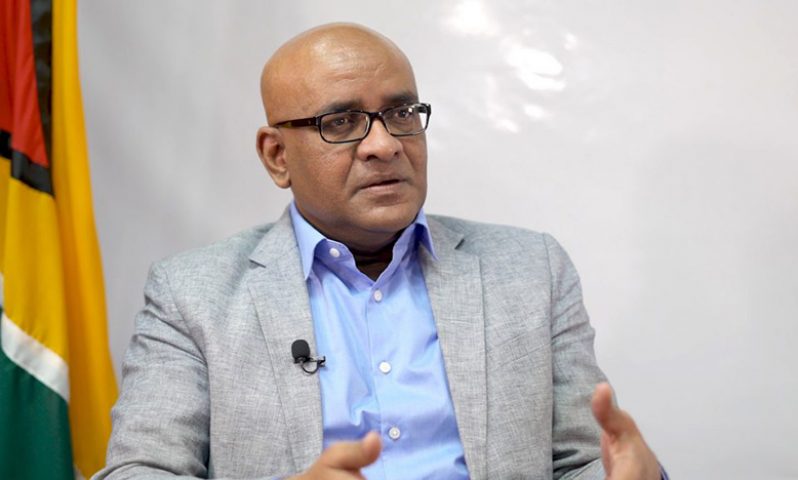THE government is aware that some foreign companies are already devising ways to circumvent provisions in the local content legislation and will continue to look at ways to strengthen the legislation and address loopholes, said Vice-President, Dr. Bharrat Jagdeo.
Speaking at a press conference on Friday at the Arthur Chung Conference Centre (ACCC), the Vice-President said the government is concerned about issues in the oil and gas industry pertaining to bundling of contracts and foreign companies instituting measures such as “fronting” to bypass requirements needed to qualify as a local company.
He reminded that the Local Content Act is a work in progress and will continue to be updated to address gaps as they arise.
“There are several ways we’ve identified now that they [foreign companies] are trying to beat the system in, and we will close those loopholes. You have to see this as a work in progress as we try to improve on the legislations,” Dr. Jagdeo said.
Passed in the National Assembly in December 2021, the Local Content Act sets out several areas and sectors where the oil and gas companies are mandated to use the services of local businesses.
The Act outlines 40 sub-sectors which would legally require oil companies to procure goods and services as well as employ specific percentages of Guyanese in their day-to-day operations. It also sets out what defines a local company.
To be considered a local entity the company has to have a Guyanese national owning 51 per cent of its shares, while the company’s management team also has to comprise 75 per cent Guyanese, while its overall staff complement has to also be 90 per cent Guyanese.
PADING NUMBERS
However, some foreign companies have been coming up with ways to pad their numbers without authentically adhering to the spirit of what the Local Content Act envisions. The Vice-President said the government is already aware of some of the means by which companies are embellishing their statistics.
“One is… they have to make a 75 per cent Guyanese management to qualify as a local company. So what they are doing is they’re taking junior staff and re-designating them as managers now, not adjusting their pay. So if have four expats they now include maybe 16 persons in management when in the past they had five. So that’s one way they are beating the loophole,” the Vice-President explained.
Companies are also finding ways to get around the 51 per cent ownership, he also observed.
“They have side agreements. So the local gets 51 per cent of the shares but they have a side agreement to get a big management fee. So they take their cut off the top from gross revenue. So that’s another way that they’re trying to beat the system,” Dr. Jagdeo told reporters.
Another area that Dr, Jagdeo noted that needs to be addressed is the length of time oil companies take to pay local businesses.
“They can’t wait 90 days to pay local company; they have to pay them earlier. We made that clear as a local positon. So we are going to close this,” Dr. Jagdeo said.
The issue of foreign companies implementing measures to outwit the local content legislation became a point of contention earlier this year when a Trinidadian company, RAMPS Logistics attempt to get listed as a local company by selling shares to a Trinidadian with Guyanese roots.
Some 51 per cent of the company’s local subsidiary was sold to Trinidadian businessman, Deepak Lall, who has Guyanese parentage. Lall had only received his Guyanese passport in 2021.
CONCERNS RAISED
The local private sector had raised concerns as more and more foreign companies are utilising the process commonly referred to as ‘fronting’ or ‘rent-a-citizen’ to satisfy the local content requirement, which reduces the amount of value which accrues to Guyana.
Dr. Jagdeo affirmed that as more loopholes in the legislation are identified and more Guyanese become competent in services in the oil and gas industry, the legislation will be further amended.
“As we go along we are going to perfect this law, we’re going to adjust the percentages and build capacity and we will identify all the loopholes along the way too and then we can close the loopholes and institute the penalties. So it’s not going to be perfect in the first year but it has shifted the momentum, the dynamic, in favour of locals, and that is what we wanted,” he explained.
Dr. Jagdeo also noted that notwithstanding the need for strengthening of the legislation, it has already begun to benefit Guyanese, particularly in how they are treated by oil companies.
“If you talk to the locals they will tell you that the attitude of the oil and gas companies and their first year contractors has change. They are more respectful now. In the past they were treating people like dirt in some cases.
Now they know they are mandated by law, there’s a fine if they don’t comply. So the respect is there,” the Vice-President said.


.jpg)











